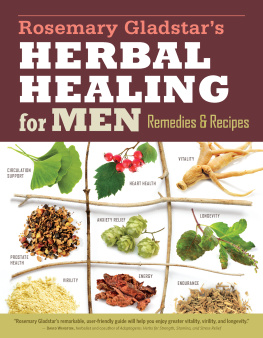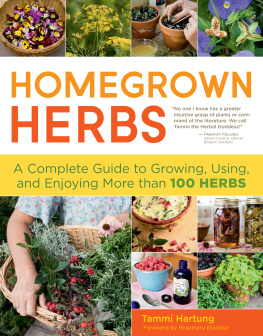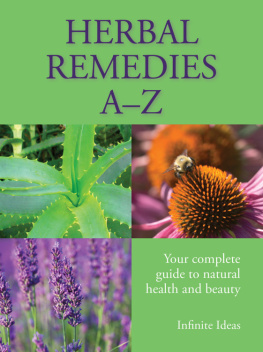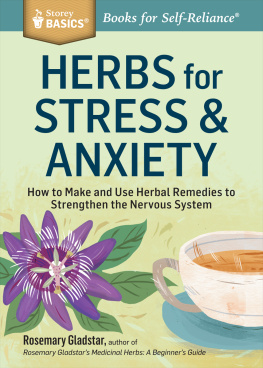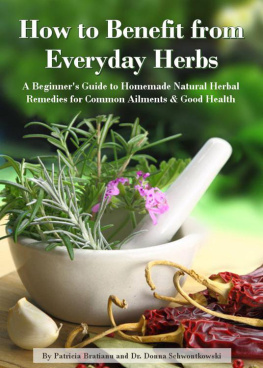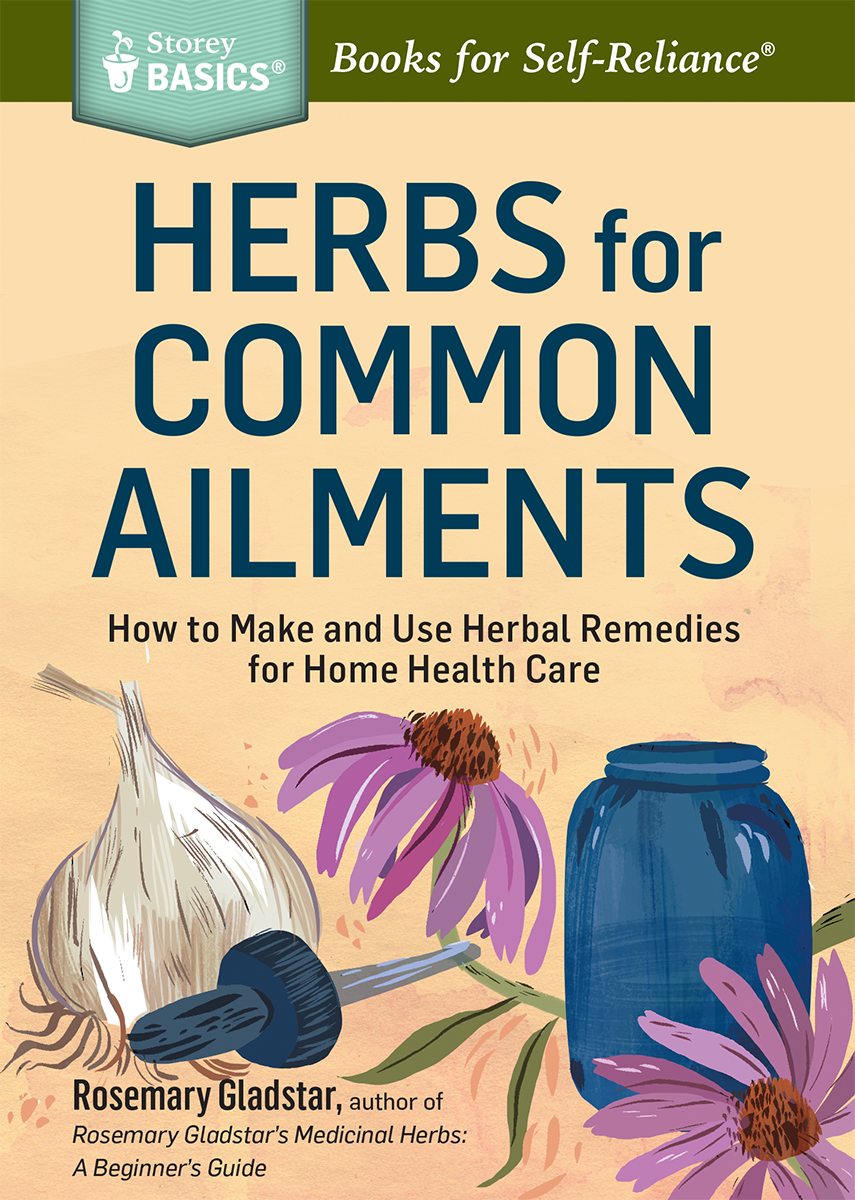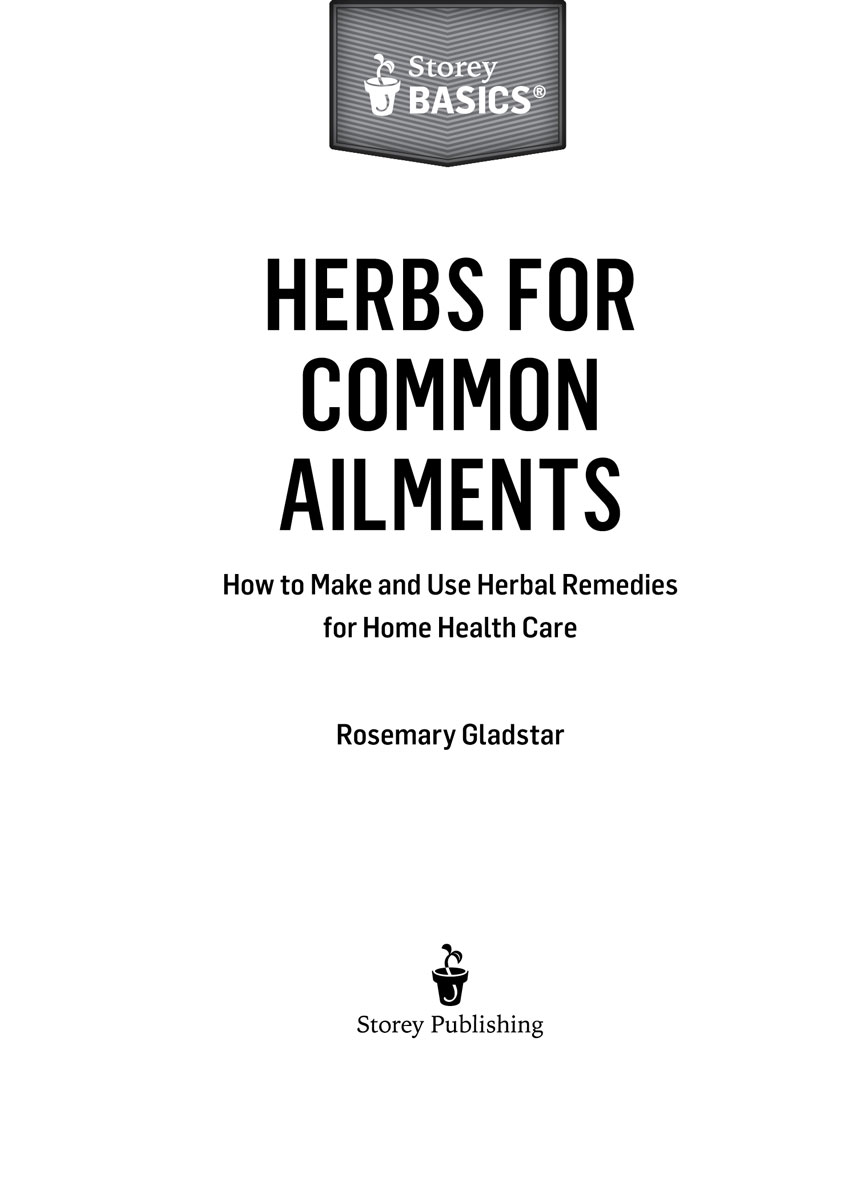Contents
Acknowledgments
There is a circle, green hands enfolded, lives entwined, of fellow herbalists. Ive held each of their hands and laughed and prayed with them, these old friends who influenced my earliest teachings. Their thoughts are embedded in my heart and flow into the words of this book.
It has been over three decades since we first met at the earliest herb gatherings in Sonoma County. We offered some of our original herb classes and went on some of our earliest herb walks together. At a time when herbalism wasnt popular or faddish, we followed our bliss, our green passion. Now practically elders, ever more impassioned by the green world, we face a new millennium, wondering not what the world has in store for herbalism but what the herbs have in store for us.
You always run the risk of forgetting someone very important as the night lights fade and the years draw on, but for this moment, Im remembering these faces from 30 years ago: Svevo Brooks, Nan Koehler, Rob Menzies, Jeannie Rose, Drake Sadler, Ed Smith, Christopher Hobbs, Michael Tierra, Sara Katz, Gabrielle Howearth, James Green, Kathi Keville, Ryan Drum, Mindy Green, Steven Foster, Mark Blumenthal, Warren Raysor, Nam Singh, David Winston, and several who have already crossed the great divide Cascade Anderson Geller, Jesse Longacre, Selena Heron, Jeannine Parvati Baker, Gail Ulrich, and Michael Moore.
May the circle ever grow and the weeds be plentiful.
Chapter One
Understanding Herbs
I was at a large conference a few years ago participating in a panel of experts on herbal medicine. Each person on the panel had been involved in herbal studies for more than two decades and was quite well known and knowledgeable about the subject. It was a long workshop, with discussions on different aspects of herbal medicine. I think we all felt fairly good about the perspectives we were sharing and the overviews we had given, but when it came time for questions and answers, the very first question came from a woman sitting in the front row. She stated quite simply, I came here hoping to gain some clarity about how to use herbs for myself and my family, and now Im more confused than ever. This book is written for her.
Choosing Herbal Medicine
With all the possible options offered by health care today, making a wise choice can be challenging. What is the most responsible thing to do? Each situation is different and warrants a different approach. In one instance antibiotics and a hospital visit may be a wise choice; in another situation herbal remedies and home treatments may be the most responsible approach to take. So how do you decide?
Basically, if your grandmother would have treated the problem at home, you probably can too. This is a sweeping statement, I know, and there are many exceptions to it. Though herbalism can be, and is, effectively used for complex health situations, even life-threatening situations at times, it is best as a home health care system.
Most illnesses and imbalances respond to nourishment, rest, and gentle natural treatments. If your body does not respond in an appropriate manner or does not respond quickly enough for the situation, then consider consulting a medical practitioner, ideally one who is interested in and knowledgeable about holistic treatments. Keep in mind that unless health care practitioners are educated about herbs, they will not be able to give you good advice on the use of herbs, and most practitioners will instruct you not to use them simply because they arent familiar with most herbs effects.
When to Use Herbs
Each situation requiring medical attention is different, and each of us as individuals responds differently to treatment. But here are some guidelines for recognizing when herbal treatments can be a better choice than allopathic medical treatments:
As preventive medicine. Herbs are inimitable for building and strengthening the bodys natural immunity and defense mechanisms. They nourish the deep inner ecology of our systems on a cellular level. Herbs are also powerful adaptogens, increasing the bodys ability to adapt to the ever-changing environment and stressors of life. Having evolved with herbs for thousands of years, our bodies have an innate familiarity with them, recognize them on the deepest levels, and efficiently utilize them.
For most nonemergency medical situations. Everyday problems such as bruises, swellings, sprains, cuts, wounds, colds, fevers, and mild (first degree) burns respond well to herbal healing. Herbs can also be an effective, on the spot first aid treatment for emergency situations in which medical help is unavailable or on its way.
As therapeutic agents. If you choose to undergo more radical forms of treatment for serious illnesses such as cancer, AIDS, multiple sclerosis, and other autoimmune disorders, herbs serve as excellent secondary therapeutic agents, supporting and replenishing the bodys life energy. Herbs and allopathic medicine work compatibly in these critical situations and can be used to complement and enhance the effects of one another.
Complementing Allopathic Health Care
Herbalism and allopathic medicine often seem at odds with one another. But they are, in fact, complementary and work together quite compatibly. Whereas allopathic drugs actively kill bacteria and viruses, herbal medicines build and restore the system. Allopathic medication generally has a specific agenda; herbs, through a complex biochemical process, take the whole person into consideration and replenish the body at a cellular level. When taken correctly, herbs do not upset the bodys innate sense of harmony, so there are few or no side effects. Using herbal therapies to complement pharmaceuticals often helps eliminate or lessen the side effects of drug therapies.
Though some of the strongest herbs should not be used in combination with allopathic drugs, most herbs do not interfere with the actions of pharmaceuticals and can safely be used to augment allopathic treatments. (None of those strong herbs are called for in this book.) There is a growing body of information about drug/herb interactions, but its important to note that most of this research is in its infant stage. People react differently to both herbal medicine and pharmaceutical medicine. Because of this, whenever youre considering using herbal medicine but youre also taking a pharmaceutical, you should consult with a holistic health care professional, who knows and understands herbal medicine, to determine if herbs are recommended in your situation.
Getting Perspective on Herb Safety
Herbs are among the safest medications available on earth. This does not mean that there are not toxic plants or herbal remedies that can cause side effects or harmful reactions in the body. But herbalism as a system of healing has been practiced for several thousand years. The herbs we use today have been used for centuries by people around the world.
Herbs that have toxic side effects have been noted and well documented; wisely, most of these herbs are not available for sale in this country. Occasionally an herb will stimulate an idiosyncratic reaction in an individual. This doesnt make the herb toxic, just a poor choice for that particular individual. Strawberries, a perfectly delicious fruit, are sweet nectar to some and a noxious substance to others. Wheat, another perfectly benign food, is an allergen to a large number of people and can cause dire consequences in a few.


